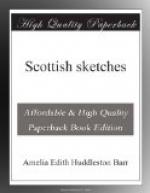“I like art, father. I can paint a little, and I love music.”
“Art! Painting! Music! Is the lad gane daft? God has gien to some men wisdom and understanding, to ithers the art o’ playing on the fiddle and painting pictures. There shall be no painting, fiddling Crawford among my kin, Colin.”
The young fellow bit his lip, and his eyes flashed dangerously beneath their dropped lids. But he said calmly enough,
“What is your own idea, father? I am twenty-two, I ought to be doing a man’s work of some kind.”
“Just sae. That is warld-like talk. Now I’ll speak wi’ you anent a grand plan I hae had for a long time.” With these words he rose, and took from his secretary a piece of parchment containing the plan of the estate. “Sit down, son Colin, and I’ll show you your inheritance.” Then he went carefully over every acre of moor and wood, of moss and water, growing enthusiastic as he pointed out how many sheep could be grazed on the hills, what shooting and fishing privileges were worth, etc. “And the best is to come, my lad. There is coal on the estate, and I am going to open it up, for I hae the ready siller to do it.”
Colin sat silent; his cold, dissenting air irritated the excited laird very much.
“What hae ye got to say to a’ this, Colin?” he asked proudly, “for you’ll hae the management o’ everything with me. Why, my dear son, if a’ goes weel—and it’s sure to—we’ll be rich enough in a few years to put in our claim for the old Earldom o’ Crawford, and you may tak your seat in the House o’ Peers yet. The old chevalier promised us a Dukedom,” he said sadly, “but I’m feared that will be aboon our thumb—”
“Father, what are you going to do with the clansmen? Do you think Highlandmen who have lived on the mountains are going to dig coal? Do you imagine that these men, who, until a generation or two ago, never handled anything but a claymore, and who even now scorn to do aught but stalk deer or spear salmon, will take a shovel and a pickaxe and labor as coal-miners? There is not a Crawford among them who would do it. I would despise him if he did.”
“There is a glimmer o’ good sense in what you say, Colin. I dinna intend any Crawford to work in my coal mine. Little use they would be there. I’ll send to Glasgow for some Irish bodies.”
“And then you will have more fighting than working on the place; and you’ll have to build a Roman-catholic chapel, and have a Roman priest in Crawford, and you ken whether the Crawfords will thole that or not.”
“As to the fighting, I’ll gie them no chance. I’m going to send the Crawfords to Canada. I hae thought it all out. The sheilings will do for the others; the land I want for sheep grazing. They are doing naething for themsel’s, and they are just a burden to me. It will be better for them to gang to Canada. I’ll pay their passage, and I’ll gie them a few pounds each to start them. You must stand by me in this matter, for they’ll hae to go sooner or later.”




